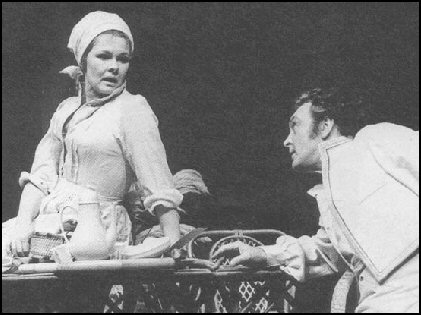 “I was so tired of reading books on Shakespeare where he was treated like a novelist and not a playwright”: Ruth Anne Henderson, from Ayr in Scotland, but resident in Piemonte (Italy) over the last 30 years, says that this is what made her decide to write her recently published book of essays on Shakespeare’s theatrical language, “Shakespeak”. “And of course it had to be in English: I’m a linguist, and especially in the chapter on metric I couldn’t possible have expressed my ideas in Italian. The point is that Shakespeare exploits the possibilities of metrical writing to guide the actor: extra stresses can create tension, additional unstressed syllables give a sense of hesitation… It’s really a matter of Shakespeare directing his own plays; the actors just have to trust him.”
“I was so tired of reading books on Shakespeare where he was treated like a novelist and not a playwright”: Ruth Anne Henderson, from Ayr in Scotland, but resident in Piemonte (Italy) over the last 30 years, says that this is what made her decide to write her recently published book of essays on Shakespeare’s theatrical language, “Shakespeak”. “And of course it had to be in English: I’m a linguist, and especially in the chapter on metric I couldn’t possible have expressed my ideas in Italian. The point is that Shakespeare exploits the possibilities of metrical writing to guide the actor: extra stresses can create tension, additional unstressed syllables give a sense of hesitation… It’s really a matter of Shakespeare directing his own plays; the actors just have to trust him.”
Ruth Anne fell for the Swan of Avon at the age of 14, when her class was taken from their school to a Glasgow theatre to see Much Ado About Nothing: “Like any youngster I went thinking how nice it was to have a half day off lessons, but I came out of that theatre a changed girl; I can honestly say my whole life has been affected”.
Klp asked Pietro Deandrea, her former student, now her colleague at the University of Turin, to interview her.
PD: “Shakespeak” is the fruit of your passion for the English language and for the theatre. Where should we start? How about Chapter 1 (“Approaches to Exposition in Shakespeare’s Plays”), where you analyse the beginnings of the plays. You make a distinction between the traditional openings, where the characters and situations are introduced baldly, and more innovative first scenes suchas Hamlet.
RAH: The opening secene of Hamlet is a ‘tour de force’: ten lines to tell us that something has made the guards jumpy, that they’re so scared they don’t want to be alone, that a “thing” has appeared to them and that one of the company is highly sceptical about the apparition. This makes the audience almost equally nervous even before the ghost appears. Hamlet, the protagonist, doesn’t even get a mention until the end of the scene.
PD: As your student, and then your colleague, I’ve always been struck – like so many others – by your sense of theatre, which perhaps is the result of your own stage experience.
RAH: Well, don’t you agree that we’re all actors in a sense when we stand up in front of a class? With 40 or 60 or 100 students, it’s a bit like being onstage in front of a paying audience: it’s not enough to be clear, to give useful information, to help them prepare for their exams – you have to be communicative, you have to make your material interesting, so that it will stick in their minds. I studied speech and drama for eleven years in English and for three in Italian, and every time I stand in front of my students I’m grateful for that training, because it helps me to come out of myself, to put aside the private person that my friends know and to be at the service of my subject. And of course as English is a foreign language for my students in Turin, it’s importnat to pronounce clearly, to be expressive, to be entertaining – without overdoing it! When I was teaching at DAMS (the Art, Music and Performing Arts Department) I could let myself go, because the students there are artistically inclined themselves; I once got up on the desk to perform the Prologue to Henry V for them. We’re not helped, either, by the lecture halls here: broken furniture, poor acoustics, huge desks that put up a barrier between the professor and the class (I always come out from behind the desk).

PD: I remember that once, talking about “King Lear” to a class, you started off by holding up a copy of the text and saying “This is NOT a book”, mucvh to the astonishment of the students. What you meant, of course, was simple enough: as you write in Shakespeak, analysing a Shakespeare text without considering performance onstage is like judging a meal on the basis of the recipe without actually tasting the food. It’s easy enough to understand the importance of acting in a teaching context, but maybe less obvious for text analysis. How important was this aspect for Shakespeak?
RAH: Absolutely fundamental. If only I could ban texts of Shakespeare’s plays from our classrooms, at school and university – I’d be overjoyed! They make studying Shakespeare such a drag, they distract the students from the true nature of the work. Just think, for instance, that on the printed page we can’t as it were “see” a silent presence, or someone who’s hiding: Hamlet offers a marvellous example here. When he speaks his most famous soliloquy, “To be or not to be”, he’s not alone; there are three other people onstage: Polonius and Claudius, hidden from his sight, and Ophelia, planted there as bait for the trap they’ve laid for the prince. If you read the text at home or in the classroom, you don’t even notice that Hamlet’s being spied on even at such an intimate moment.
PD: Something else that distinguishes your book is your work on language, enriched by your training as a mediaevalist and as a language historian. For instance, I was struck by what you say about the beginning of Coriolanus, where there are many words of Latinate origin which in theory could be hard for the ordinary members of the audience to understand; but you point out that most of these words had been in the language for at least a hundred years, so had already become part of ordianry speech. Then in Chapter 4 (“Shakespeare and the Language of Madness”), you concentrate on Hamlet’s madness: real or assumed? How can linguistic analysis throw light on this famous problem?
RAH: Read Chapetr 4 and you’ll see!! Joking apart, I read up on the language of madness in literature (for example, Blanche in “A Streetcar neamed Desire”), in psycholinguistic texts and in other plays by Shakespeare. When the mind gives way, so does control of language, sometimes even to the point where you lose syntax. There are moments when Hamlet is obviously agitated and tends to stammer, to repeat himself, to talk something very close to nonsense; but overall he’s coherent, which cannot be said of Ophelia or Lear, both of whom are indisputably mad.
PD: Perhaps the most original aspect of your book is the attention you give to metrical analysis in Chapter 3, “Shakespeare, Blank Verse and the Actor”.
RAH: I hope this may be a genuinely original contribution to Shakespeare criticism. I learned almost everything I know about metre from my first drama teacher, in my home town: her name was Ann Girdwood and I owe her a great deal, because she used to have us analyse the metre of every poem and every Shakespeare text that we studied with her, she commented on the distribution of the accents, showing us how crucial it was to interpretation. I tried to do the same thing in Chapter 3. If you “feel” the metre you realise that Shakespeare is guiding the actor to stress certain words so as to communicate the state of mind (and heart) of the speaker. He marks the pauses, he adds stresses to create tension… if the actors trust him, Shakespeare himself does half their work for them.
PD: Most critics today claim that the most innovative interpretations of Shakespeare today tend to come from non-Anglophone countries, because translations of the texts leave more room for interpretation. A few years ago there was a discussion in Britain about whether his language should be modernised to bring it closer to the sensibility and understanding of today’s audiences. What’s your thinking on that point?
RAH: If it’s a matter of changing the odd word that no longer forms part of current langauge, without changing the sense of the line, and respecting the metre, I don’t have any objection. At the same time, we seem to be set on reducing everything to the lowest common denominator in the name of “today’s audience and their level of understanding”. Maybe we should start stretching the audience instead of condescending to them, maybe we should all make a bit more effort, if we don’t want all art to be brought down to the level of the worst of modern television. If Shakespeare is acted well, he “gets over” to the audience even if he doesn’t use English exactly as we do. Let’s not give our idols feet of clay!
On the other hand, I’m all for innovative interpretations, as long as the original is respected: for instance, I loved Baz Luhrmann’s film “Romeo + Juliet” in which not a word was changed, but the text was made accessible to our contemporary youngsters.
PD: Of all the Shakepeare productions you’ve seen, which is your favourite?
RAH: Without a shadow of a doubt, “Much Ado About Nothing” in London, in I think 1975, with Donald Sinden, a hilarious, acid-tongued, uproariously funny Benedick, and our greatest theatrical performer, Judi Dench, as Beatrice: immensely complex, capable of making the audience laugh and cry almost simultaneously. Indeed, my little book is dedicated to Judi Dench, with her permission, to thank her for all she’s taught me about Shakespeare through her masterly interpretations.
R. A. Henderson
Shakespeak: Essays on the Language of Shakespeare’s Plays
Torino
Trauben ed.
2009
pp. 155
10 euro









